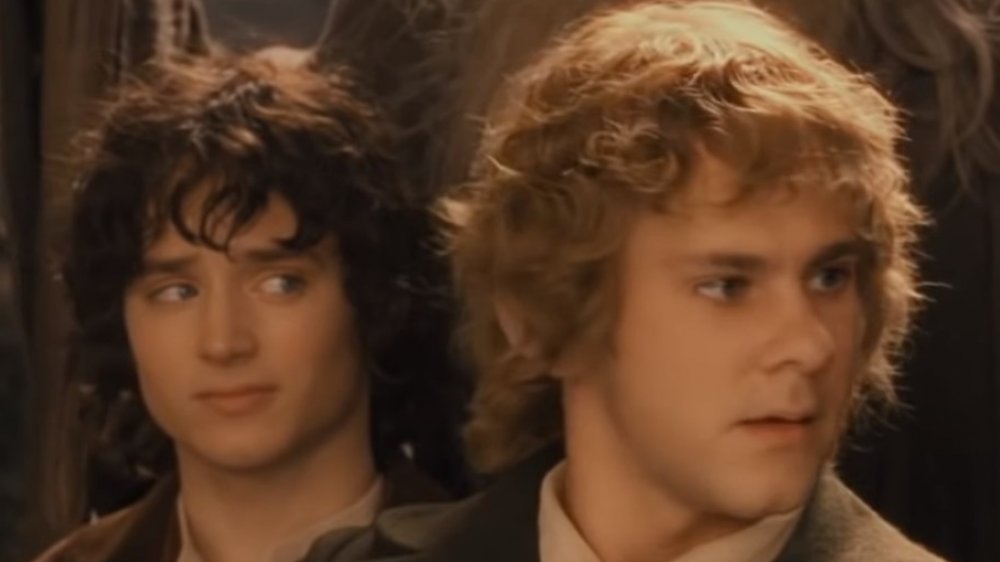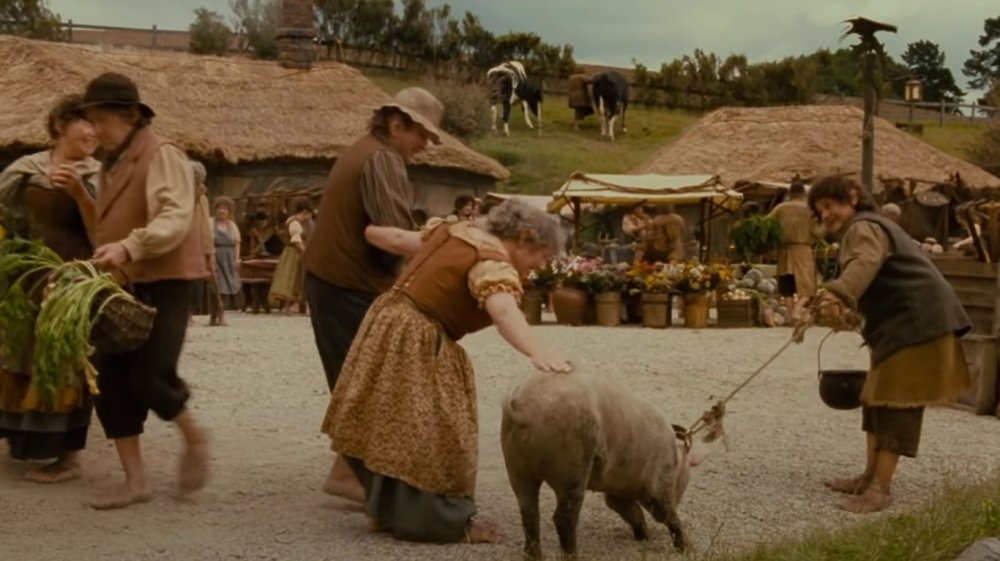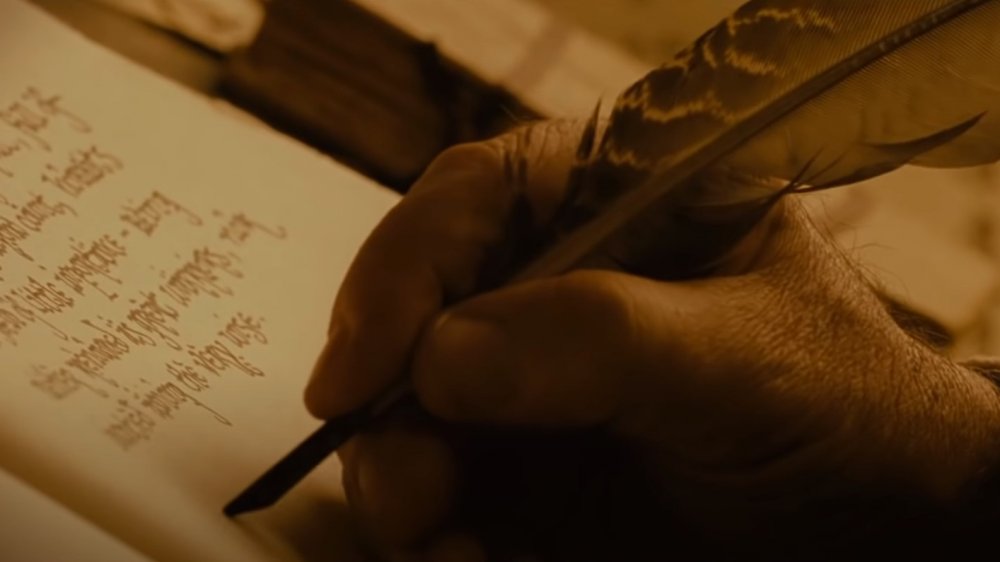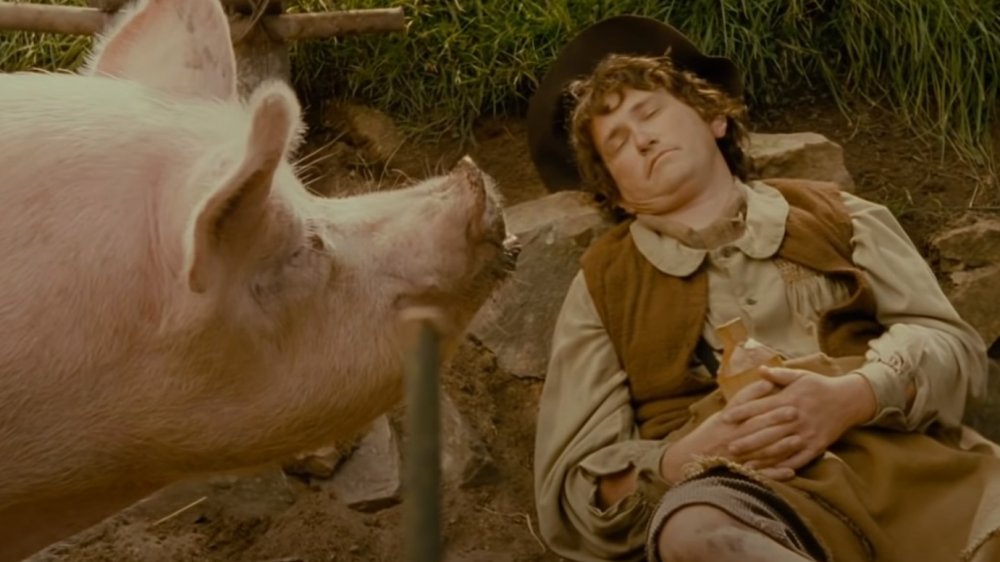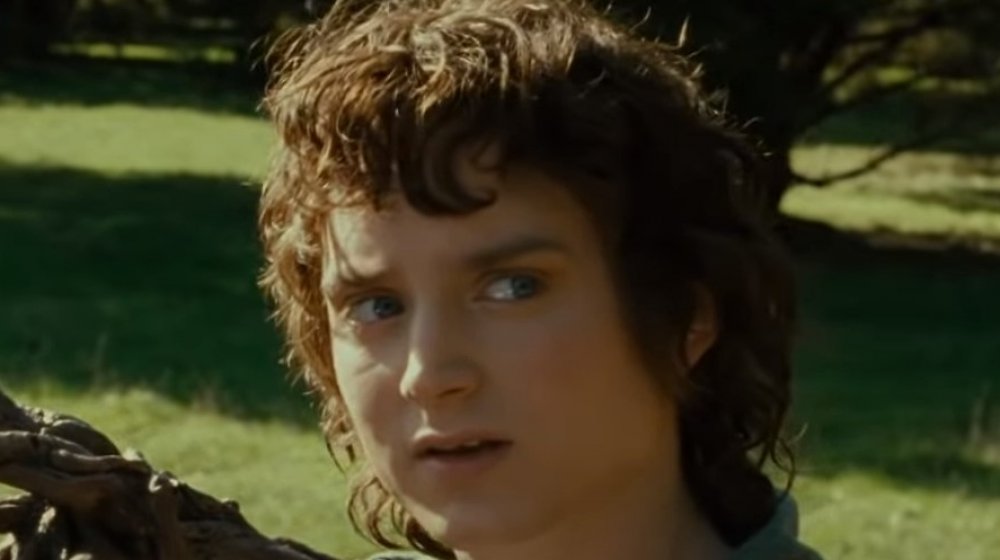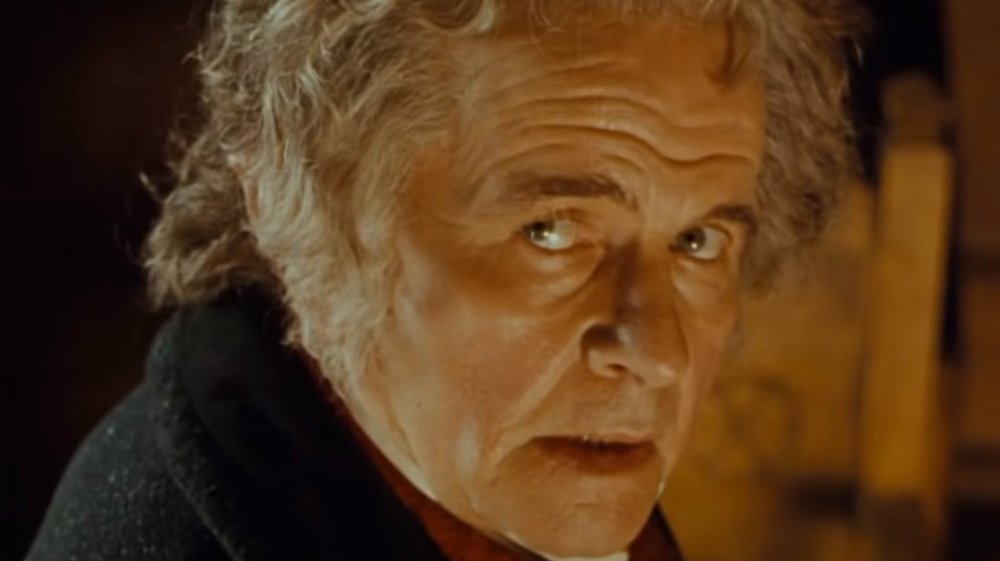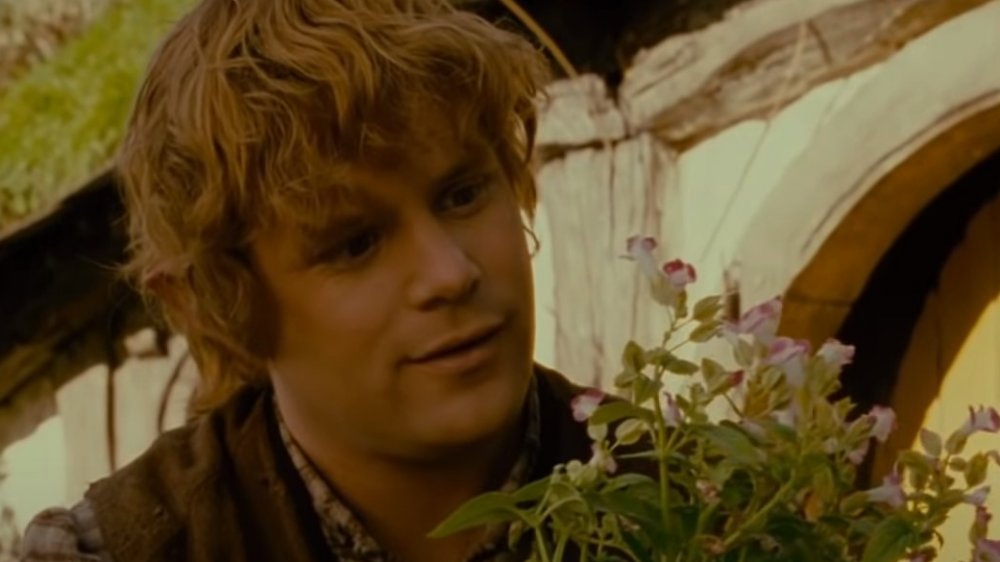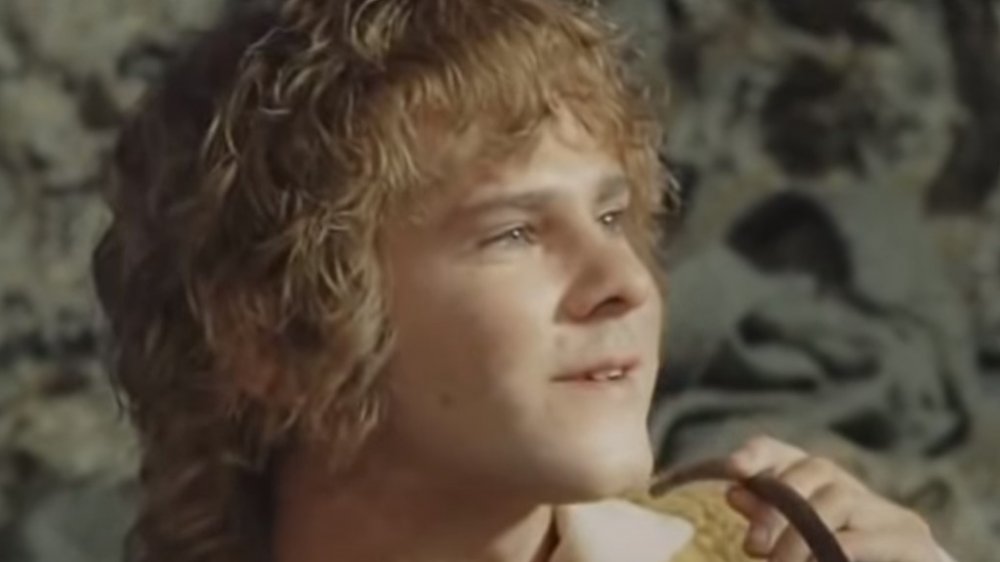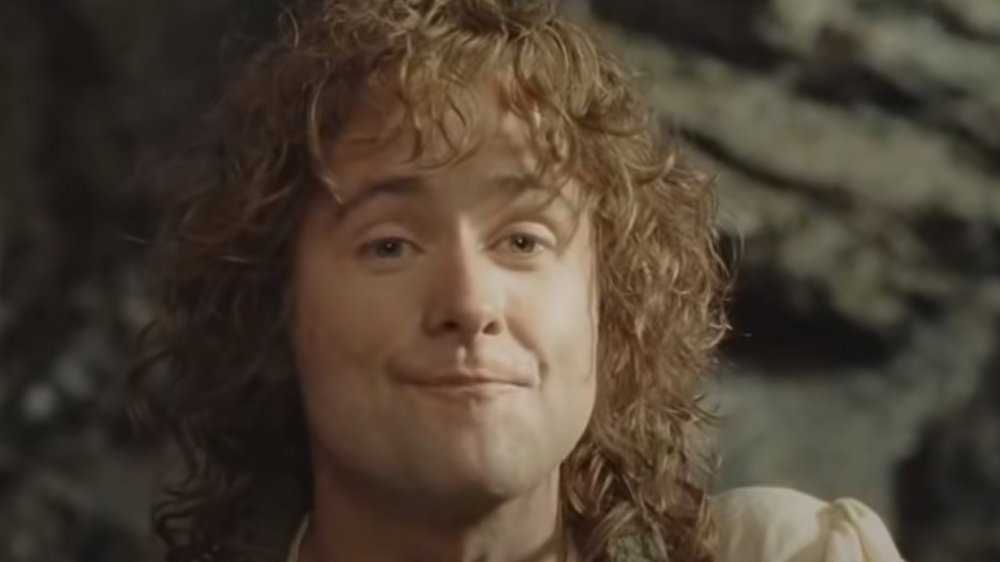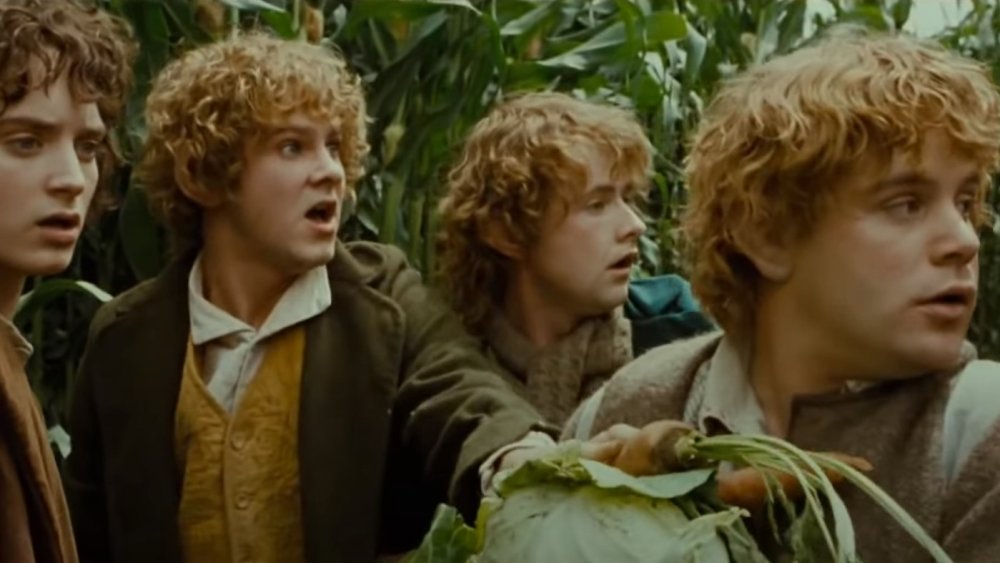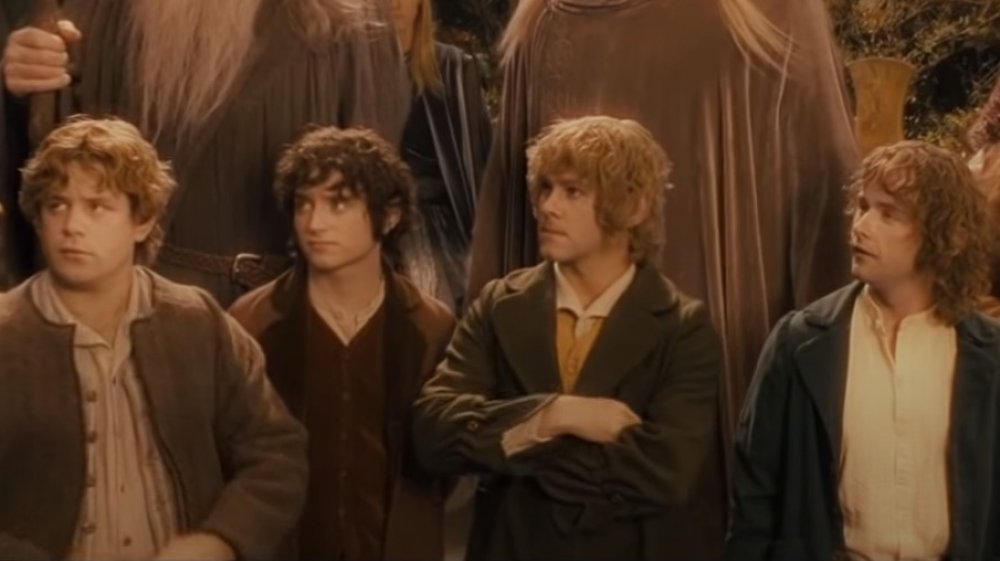The Backstory Of The Lord Of The Rings' Hobbits Explained
Middle-earth is a grand setting for J.R.R. Tolkien's immortal tales of heroism, villainy, and magic. It is a place of legendary kingdoms, ruled by brave, strapping men, stout, honorable dwarves, and graceful, immortal elves. And, oh yeah — Hobbits.
The Hobbits are a humble folk, fond of creature comforts and simple living. So how did the Halflings of the Shire come to hold the fate of all the world in their wee hands? What led four Hobbit friends to embark upon the most dangerous, important journey ever taken? And why do they care about breakfast so much?
Much of the action in The Lord of the Rings trilogy is driven by five Hobbits: Bilbo, Frodo, Sam, Merry, and Pippin. And while you may recognize these names as the greatest heroes of Middle-earth, you might not know that they all had rich Hobbit-y lives before they'd ever heard of Sauron and the Rings of Power. We're here to break down these half-pint heroes' backstories, from their underground homes to their fondness for pipe-weed.
Concerning Hobbiton and surrounding areas
Nestled between high, harsh mountains and lush, verdant fields lies the Shire, inhabited by the Hobbits. The Shire is relatively secluded, a bucolic idyll much beloved by its Hobbit inhabitants. There, they live in pastoral peace — but their neighbors live very different lives indeed.
To the south lies Rohan, a wide country inhabited by fierce men known as the Rohirrim, also referred to as "the horse lords." The Rohirrim are a mighty race of men, devoted to animal husbandry and battle. Further south lies Gondor, another land of men, and traditionally, the seat of the king, though at the time the Hobbits begin their journey, there hadn't been a king on the throne in generations.
While the humans of these lands toil and make war with each other, the sleepy Shire goes on, relatively unnoticed. But that does not mean that Hobbits don't have their own proud traditions — or their own strong grudges. Though Hobbits are all pretty similar in custom, dress, and appearance, they often mistrust folks from a region other than their own. This wariness is a trait shared by many humans as well, and is perhaps evidence of the link between the two peoples, as Hobbits are said to be a sub-branch of humanity.
Hobbit history
When and how the Hobbit evolutionary line split from the tall and hardy race of men is not fully known. When Hobbits began recording their modern history, much of that information had already been lost. What is known, however, is that Hobbits once lived in a wider range of territory. By the time of Frodo's journey, however, they had become concentrated within the Shire and the village of Bree.
In the past, Hobbits lived much closer to the Rohirrim, and legends of their kind still circulate as children's stories among the people of Rohan. Then, at some point in their history, the Hobbits left their ancestral homes on the banks of the Anduin River and crossed the Misty Mountains. It is likely that they sought new lands because of Sauron's growing influence in the east — though not all Hobbit folk went west. It is believed that Gollum is descended from a branch of Hobbits that remained near the Anduin River.
After settling in the farmland west of the mountains, Hobbit culture and history began in earnest. These peaceful people began to put down roots and tame the land to produce excellent food, cozy houses, and top-tier pipe-weed.
Culture and customs
Agriculture is central to Hobbit life. Their lives are organized by the rhythms of planting, reaping, and preparing the fruits of harvest — and boy, do they like to enjoy that harvest. Traditional Hobbit days include breakfast, second breakfast, elevensies, luncheon, afternoon tea, dinner, and supper. That's right: Hobbits eat a meal every two hours or so, sometimes with snacks in between. Rolling farm lands with all the food you can eat every few hours? Sounds like paradise.
Generally speaking, Hobbits adhere to fairly strict cultural norms. Though they aren't a repressive society, they do not look fondly on people who do a lot of out-of-the-box thinking. While some cultures celebrate adventurers and rule-breakers, Hobbits like to keep things steady. Violence is frowned upon and rarely necessary, as Hobbits are generally well-meaning.
Hobbits' relationships with the other sentient races of Middle-earth vary. Intermingled in the town of Bree are many humans, similar to Hobbits in their agrarian lifestyle. Hobbits and dwarves have dealings occasionally, as dwarves use some of the roads running through the lands of the Shire. Elves are considered nearly mythical creatures, although all Hobbits know they exist — contact between the two races is simply that rare.
Frodo Baggins
Frodo Baggins was in many ways, an exception to Hobbit norms. An only child, Frodo was born on September 22 to Drogo Baggins and Primula Brandybuck. Both were from well-known Hobbit families with a fair amount of wealth and respectability, and Frodo seemed to be on track to lead a very normal life ... until tragedy struck. Drogo and Primula were both drowned in a tragic boating accident when Frodo was only 12. The young Hobbit was taken in by relatives of his mother, the Brandybucks, and raised in Brandy Hall.
Frodo was a young dreamer who stood out from the crowd, showing much more ambition than the average Hobbit youngster. Folks took notice of this, including his enigmatic cousin, Bilbo Baggins, who adopted Frodo after his 21st birthday. The two actually shared that birthday, as well as a love for Elvish culture. Bilbo made Frodo his heir and encouraged his adventurous dreams, having lived an epic story of his own that would change the course of Frodo's life forever.
Bilbo Baggins
Bilbo Baggins was as respectable as any Hobbit. He lived in Bag End, the ancestral home of his family in Hobbiton, until adventure came calling in the form of the wizard Gandalf. Gandalf was one of the most powerful beings to walk Middle-earth. Though he had the appearance of an elderly human man, he contained deep wells of magic and insight far beyond the capabilities of mortals. He was unusual for a wizard in that he took a great interest in Hobbits, recognizing their resilience and strong spirits. It was Gandalf who enticed Bilbo to join a party of dwarves on an adventure to reclaim a mountain overrun by the dragon Smaug.
Over the course of this adventure, Bilbo was separated from the group, lost in the bowels of an orc-infested mountain where he stumbled across a magical ring. This was the One Ring, forged by the fiendish Sauron to enslave the whole of Middle-earth.
Bilbo survived the journey and kept the ring, unaware of its true nature. He returned to Hobbiton, adopted his nephew Frodo as his heir, and resumed his pleasant Hobbit lifestyle, albeit under a cloud of rumors. In his golden years, he decided to go adventuring again, and left his ring and all his possessions to Frodo.
Samwise Gamgee
A house like Bag End doesn't take care of itself. Like any well-off family, the Baggins' had staff. Old Gaffer Gamgee was a skilled gardener and widely respected as an expert on all things potatoes. He was the gardener for many years at Bag End, taking care of all manner of growing things on the property. He was also a family man with six children, one of whom would rise to become the most loyal, brave Hobbit ever to roam Middle-earth: Samwise Gamgee. When his father began to age and the strenuous tasks of a gardener's life began to wear heavily on the old Hobbit, Samwise took over his father's work.
The Gamgee family lived near Bag End, and Frodo and Sam became friendly. Bilbo Baggins also befriended the young and inquisitive Hobbit, and instilled in him a love for elves and poetry.
Despite his humble life, there was something in Sam that wondered at the marvels of the world and longed for adventure. He would get his chance when Gandalf appointed him Frodo's protector and sent them both on their journey to destroy the One Ring.
Merry Brandybuck
Meriadoc Brandybuck was the only child of a respectable and well-off Hobbit family. The Brandybucks were the hereditary rulers of the area inhabited primarily by Hobbits known as Buckland. A peaceful and beautiful area with rolling farmland and good soil, their rule over the area was rule in name only, as Hobbits generally don't need much leadership and conduct their own affairs.
Merry befriended his cousin Frodo at a young age. Merry displayed more thoughtfulness than many Hobbits, and had a striking love for boats — qualities that aren't unheard of among Hobbits, but did mark him as a tad unusual.
Merry had another cousin, the son of his mother's brother: A bright and bubbly Hobbit named Peregrin, known to most as Pippin. The two became the very best of friends from a young age, and they roamed and romped around the Shire getting into innocent scrapes and having mild adventures of the Hobbit variety. Merry knew that he would take on the mantle of Master of Buckland some day, and probably thought that would be the most exciting thing to ever happen to him. As fans know, he was very wrong.
Pippin Took
Peregrin Took had humble beginnings in Hobbiton just like the rest of the legendary Hobbits he would travel Middle-earth beside. Like his cousin and best friend Merry, he was the only son of a well off-Hobbit family, the Tooks. Though the youngest child, he was destined to inherit the title of Thain of The Shire, a mostly nominal ruler primarily in charge of the land and military. The military duties and responsibilities of the Thain were not often called into action as the Shire had known only peace for decades before the War of the Ring.
Pippin grew up in the peace and beauty of the Shire, in a venerable Hobbit house known as Great Smials. He became close friends with his first cousin Merry and would also befriend his more distant cousin Frodo Baggins. That friendship would change his life and propel him towards a vast and magical destiny.
Life-changing frienships
Romping around the farmlands, splashing through rivers, getting into all kinds of scrapes and scraps — it's a pretty idyllic way to grow up. And for the Hobbits who would one day take the One Ring to Mordor, it was.
Frodo Baggins was the oldest of the four, and he took a great liking to his younger, wily cousins Merry Brandybuck and Pippin Took. Though Frodo was some years older, the three became best friends. That friendship would become invaluable as they would all help save each others lives, and the lives of all who dwelt within Middle-earth. Sam was the odd man out at first, as he came from a humble working-class family of Hobbits. But that didn't matter once the four Hobbits got to know each other. Their friendship was cemented, and their destiny began.
While they are a very peaceful folk, Hobbits are also exceptionally brave. Their ties of kinship and loyalty are so strong that when Frodo was called upon to undertake the adventure to destroy the One Ring, the other three went along with him willingly.
The call to adventure
Bilbo returned from his adventure with the dwarves with a share of the fabulous wealth recovered from Smaug's horde. One prize he kept secret, however, was the One Ring. But Hobbits are good at rooting out secrets. Merry, at least, caught on to the fact that Bilbo possessed a magical ring earlier than some, though luckily he kept that knowledge to himself. All four who would embark upon the journey to destroy the One Ring had great respect for and liking of the wizard Gandalf. So when he warned Frodo of the dangers of the ring and the need to destroy it, the four took the warning seriously.
In time, Bilbo left the Shire and the burden of the One Ring and its destruction became Frodo's. Frodo originally planned to depart on the dangerous journey to destroy the ring alone. Merry and Pippin, with the help of Sam as an inside man to the goings-on at Bag End, hatched a plan to aid Frodo and accompany him on his trip. It was not merely the evil of the ring that made the other Hobbits accompany Frodo. It was the simple power of friendship and the bravery deep in their hearts that propelled them to undertake the journey to Mordor. It was that bravery and love that would save the world.
